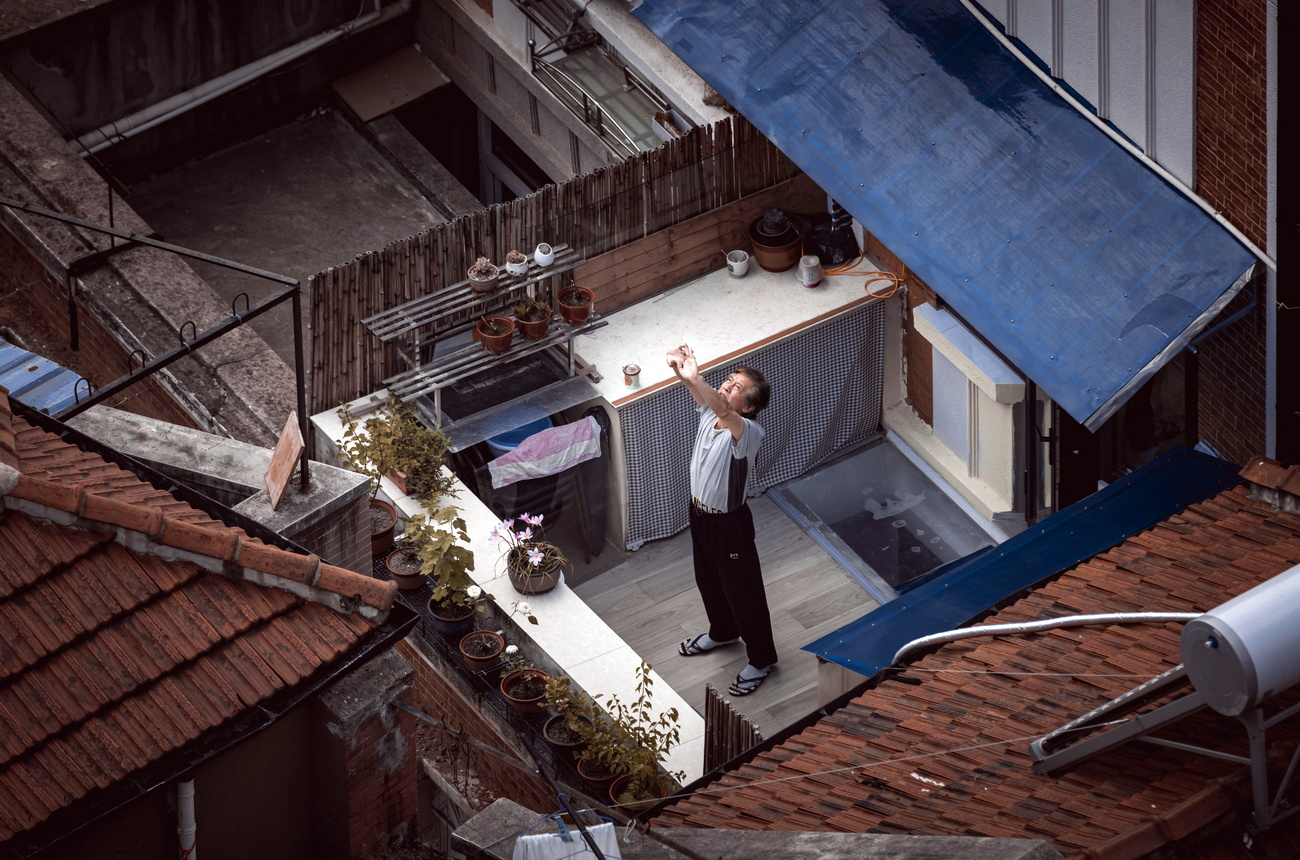The challenges of decentralising vaccine production to Africa

A new fund launched by Geneva-based vaccine alliance Gavi aims to bring more justice and promote vaccine production in Africa. It’s a good start, but more needs to be done, say observers.
During the Covid pandemic, the US pharmaceutical company Johnson & Johnson produced their Covid vaccine in South Africa. This was then exported to Europe, leaving the local population with no production for themselves.

In the wake of the pandemic, Gavi, which aims to improve the supply of vaccines to poorer countries, is pushing for better access to vaccines to become a priority for the international community, an approach that is widely supported by the G7 and G20 countries.
“Today, Africa imports 99% of the vaccines that are needed on the continent,” David Kinder, Gavi’s director of development financing, tells SWI swissinfo.ch. This includes vaccines against malaria and cholera, which kill hundreds of thousands of children every year. The Gavi vaccine alliance includes UN organisations such as the World Health Organization (WHO), UNICEF and the World Bank, as well as developing and donor countries, the vaccine industry, research institutions, the Bill & Melinda Gates Foundation and NGOs.
Their solution to avoid another hoarding of vaccines by rich countries, as was the case during the Covid-19 pandemic, is decentralising vaccine production and promoting production in the countries that need them most: those on the African continent.
Historic change
To achieve this, Gavi launched a new financing instrument: the African Vaccine Manufacturing Accelerator (AVMA). This will help the African Union, which comprises 55 countries in the continent, produce 60% of the vaccines they need by 2040. The official launch of the AVMA is planned for June 20 in Paris.

More
How drug prices are negotiated in Switzerland and beyond
The AVMA is a fund endowed with $1 billion (CHF900 million) over ten years. The money comes from outstanding funds in the Covax initiative. This multilateral collaboration, launched in 2020 to provide poorer countries with vaccines against the Sars-Cov-2 virus, was terminated in December 2023.
“Gavi’s goal with the AVMA is to create a market to lower vaccine prices,” Kinder explains.
The AVMA intends to help African manufacturers remain competitive against well-established players such as Johnson & Johnson or Roche, which are able to drive down their prices due to economies of scale.

This is a historic change from previous efforts in which Gavi focused its budget on mostly buying vaccines from the world’s largest pharmaceutical manufacturers. For a long time, this approach was considered cost-effective. However, it also increased the concentration of vaccine production among a few manufacturers and left little room for new suppliers.
As one of the largest purchasers of vaccines worldwide, Gavi is sending a strong signal to the global markets that it supports African vaccine production, Kinder says. This will help manufacturers plan production based on expected demand.
Priority vaccines and technologies
How will the AVMA work? The fund will support African manufacturers with two incentive payments to help them create a level playing field with other producers around the world.
As a starting point, Gavi has defined vaccines that the fund should prioritise. In addition to those against cholera and malaria, these include those against measles, rubella, yellow fever and Ebola. Gavi also wants to focus parts of the AVMA on new technologies that will enable African manufacturers to quickly adapt their production in the event of a next pandemic. These include synthetic gene-based mRNA and viral vector vaccines. Unlike previous vaccines, neither of these contain inactivated pathogens, but they introduce the genetic blueprint for pathogen antigens into human cells. The cells then use these instructions to produce antigens themselves, which trigger an immune response.

More
Big Pharma steps up race for AI-discovered drugs
So far, mRNA has been authorised only for the Covid-19 vaccine, but it’s a technology pushed by the WHO, which is supporting governments in establishing production capacities. “We have set up a technology transfer centre for mRNA in South Africa, which will pass on the technology to our partners in 15 countries,” says Martin Friede, co-head of the WHO mRNA technology transfer programme.
African manufacturers first have to apply for a prequalification – that is self-financed — of their vaccine at the WHO. Those that qualify will receive an initial payment of between $10 and 25 million from the AVMA. The maximum amounts are earmarked for mRNA and vector vaccines. The second payment is intended to help African manufacturers submit their offer to Gavi tenders.
“They will receive between $0.30 and $0.50 per dose so that they can compete on equal terms with our established manufacturers,” says Kinder. This is also meant to send a signal to investors such as the World Bank or the European Investment Bank (EIB) that the production is guaranteed to be sold.

While the AVMA is the international initiative providing most financing to promote local production of vaccines, observers say many issues remain unanswered for African countries to become producers in their own right.
No money for product pipeline
The AVMA programme leaves producers looking for their own funds for much of the product pipeline: from R&D to clinical trials, production and distribution. Els Torreele, a bioengineer and independent researcher at University College London (UCL), says the World Bank and the EIB willingly finance the development of infrastructure, often with loans or investments that have to generate returns. But development financial institutions are nearly absent when it comes to financing product development or providing grants. As an example, the South African company Afrigen is currently struggling to obtain funding for the development of an mRNA product pipeline, which included developing a Covid-19 vaccine. The company is at the centre of the initiative coordinated by the WHO to decentralise mRNA production.
To ensure equal opportunities, Torreele also believes that production must not only be local but also be embedded in national and regional health policies.
Currently AVMA defines local production as being geographically located in Africa, Torreele says. This means that an international company that produces vaccines in Africa through a subsidiary is eligible for funding. The fact that such “localised” production does not lead to fair results was illustrated, for example, by the production of the Covid-19 vaccines by Johnson & Johnson in South Africa, mentioned at the beginning of this article.
Financing technology transfer
Furthermore, no money is planned by the AVMA for the acquisition of transfer of technology. This is meant to happen indirectly, for example by an outside competitor investing in the production facilities, such as an Indian manufacturer. This leaves the local manufacturer in a weak position to negotiate.
If you want to support technology transfer (TT), you have to finance it directly, Torreele says. “TT contracts must be fair and conducive to the development of local production capacities. However, the conditions are often restrictive because a company does not want to strengthen its competitors,” she says.
Friede from the WHO would also welcome increased TT funding.

More
How committed is the world to a stronger WHO?
The International Federation of Pharmaceutical Manufacturers and Associations (IFPMA), a lobby group, says a sustainable vaccine ecosystem and equitable access to innovative vaccines in Africa requires the cooperation of all stakeholders.
Torreele emphasises that for an equitable supply of vaccines, developing countries and local manufacturers must have the power to decide on the technology and facilities for vaccine production, what they produce and for whom they produce it.
“The biotech sector in Africa is still young,” says Kinder from Gavi. “It will take some time for new manufacturers to reach the required size for sustainable production.”
Edited by Virginie Mangin/ts

In compliance with the JTI standards
More: SWI swissinfo.ch certified by the Journalism Trust Initiative








You can find an overview of ongoing debates with our journalists here . Please join us!
If you want to start a conversation about a topic raised in this article or want to report factual errors, email us at english@swissinfo.ch.